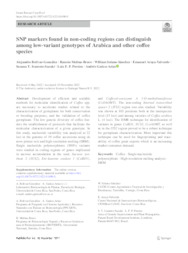SNP markers found in non-coding regions can distinguish among low-variant genotypes of arabica and other coffee species.
SNP markers found in non-coding regions can distinguish among low-variant genotypes of arabica and other coffee species.
Autoria: BOLÍVAR-GONZÁLEZ, L.; MOLINA-BRAVO, R.; SOLANO-SÁNCHEZ, W.; ARAYA-VALVERDE, E.; IVAMOTO-SUZUKI, S. T.; PEREIRA, L. F. P.; GATICA-ARIAS, A.
Resumo: Development of efficient and scalable methods for molecular identification of Coffea spp. are necessary to accelerate studies related to the characterization of germplasm for both conservation or breeding purposes, and the validation of coffee germplasm. The low genetic diversity of coffee hinders the establishment of protocols that facilitate the molecular characterization of a given genotype. In this study, nucleotide variability was analyzed at 22 loci in the genome of 19 coffee accessions using de novo primer sets and high-resolution melting (HRM). Single nucleotide polymorphisms (SNPs) variants were studied in coding regions of genes implicated in sucrose accumulation in the seed, Sucrose synthase 2 (SUS2), Ent-kaurene oxidase 1 (CaKO1), and Caffeoyl-coenzyme A 3-O-methyltransferase (CcOAOMT). The non-coding Internal transcribed spacer 2 (ITS2) region was also studied. Variability was shown at 103 positions both at the interspecies level (15 loci) and among varieties of Coffea arabica L. (4 loci). The HMR technique for identification of variants in genes CaKO1, SUS2, CcoAOMT, as well as in the ITS2 region proved to be a robust technique for germplasm characterization. More important this technique can be used for fingerprinting and traceability of coffee grain exports which is an increasing market-consumer demand.
Ano de publicação: 2022
Tipo de publicação: Artigo de periódico
Unidade: Embrapa Café
Palavras-chave: Coffea Arábica, Genotype, Single nucleotide polymorphism
Observações
1 - Por padrão são exibidas publicações dos últimos 20 anos. Para encontrar publicações mais antigas, configure o filtro ano de publicação, colocando o ano a partir do qual você deseja encontrar publicações. O filtro está na coluna da esquerda na busca acima.
2 - Para ler algumas publicações da Embrapa (apenas as que estão em formato ePub), é necessário ter, no celular ou computador, um desses softwares gratuitos. Sistemas Android: Google Play Livros; IOS: iBooks; Windows e Linux: software Calibre.
Acesse outras publicações
Acesse a Base de Dados da Pesquisa Agropecuária (BDPA) para consultar o acervo completo das bibliotecas da Embrapa.

